This page is an analysis of the Secret Heart by Robert P. Tristram Coffin. It’s the best analysis of the Secret Heart poem that you will find anywhere on the web.
First we present the summary and structure of the poem. Next, we do a line by line analysis highlighting important images and symbols from the poem. Finally, we explain the meaning of the poem. As an extra bonus we include some biographical information about Robert P. Tristram Coffin.
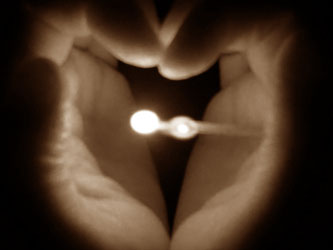
The Secret Heart, poem summary and structure
The Secret Heart is a poem by Robert P. Tristram Coffin. It was written in the early 1900s, and then republished many times. Most people use Robert P. Tristram Coffin’s Collected Poems as a source for the poem. We are not sure in which book The Secret Heart first appeared.
The story is very simple. A boy is sleeping in his bed. He is awakened by his father, who has struck a match for light, so he can check on his son. The father is cupping the match to both amplify the light and to guard it from any possible draft. The boy looks up at the father and sees the light of the match framed by his fathers hands. To the boy this looks like a heart with a flame burning with in. The light goes out, and then presumably the boy goes back to sleep.
Each line in the poem is generally either seven or eight syllables. The poem is made up of eleven rhyming couplets, which also act as stanzas, thus there are eleven stanzas. The intonation of the poem constantly rises and falls giving the poem a sing-song quality. It’s very fun to read the Secret Heart aloud, you should try it.
The Secret Heart, a line by line analysis
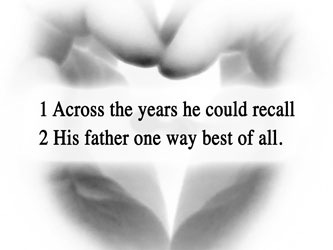
Lines 1 and 2 of the Secret Heart set up tension and create interest in what will follow. The narrator is going to tell us about the way he remembers his father best—even after many years have gone by. So what follows must be important.
The lines also help us understand that this entire narrative is going to be a flashback to a childhood memory of the narrator.
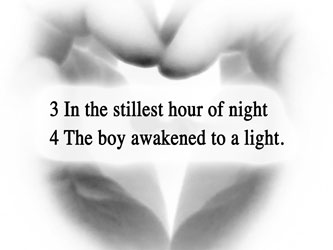
Lines 3 and 4 of the Secret Heart gives us the setting. It’s late at night. It’s dark and still. A boy awakens to see a light. This is very nice narration.
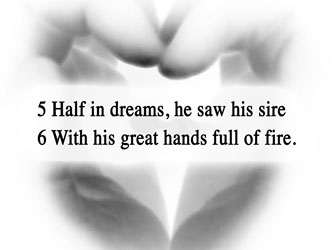
Line 5 of the Secret Heart helps us understand the narrator’s situation. He’s not quite awake. He’s in a world between dreaming and reality. He’s half in the dream world. It’s easy to see things in a more symbolic way when one is only half awake. Note how he refers to his father here as his “sire”. That’s a very grand word. It’s appropriate for kings or perhaps mighty stallions.
Line 6 of the Secret Heart leaps out at you. “Hands full of fire” is a stunning image! Wow. How would you like to see someone mighty with hands of fire coming at you in the dark still of the night? It’s godlike imagery.
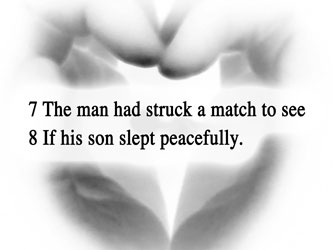
Lines 7 and 8 of the Secret Heart are basically narration to explain what’s happening. Line 7 carries us nicely to line 8 as it’s not quite a complete thought.
Also, ask yourself the following question. Does the father check on his son every night like this? Probably not—after all the boy has only this one memory. So why this one night? Was the boy sick? What was the concern? We can’t really say from what’s given in the poem, but it might be suggested the boy was sick at the time.
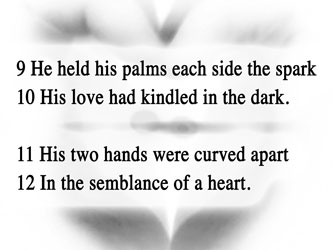
It’s hard for some people to visualize lines 9 to 12 of the Secret Heart. Cup your hands together as if you were holding some water. Now, try to make the outline of a heart. Finally, imagine a long wooden match as being placed between your right hand’s thumb and forefinger, and pointed down toward the cup of your hand. It’s okay if the hands spread apart a little bit, but by now hopefully the image is clear.
Lines 9 to 12 not only provide a stunning visual image, but they are also potent with meaning. Ask yourself this, what is the source of light here? It’s the match, right? But isn’t it also the love of the father that has brought this light into existence? Do you see the play here between light, love, and even life? These all coexist together, and the source is the father. The father brought the light into existence by striking the match. The father also in a very tangible sense brought his son into existence. Why does he do these things? Out of love.
Appropriately or not one could easily read religious symbolism into this and compare it with Christian ideas about the source of life—especially, and quite obviously, notions of the sacred heart. If you’ve never read anything about the Sacred Heart before, we suggest reading up on it. There’s clearly comparisons between the poem and the Sacred Heart that can be made.
Although we won’t go into it here, one could just as easily read into this Freudian symbols regarding the source of life—just play around with these symbols for a moment, and you’ll see what I mean. We’re sure the poem is probably susceptible to some Jungian analysis as well.
However you want to view this image, it’s clearly deeply symbolic. The question then for the reader is what does it symbolize? We’ve given some of our own ideas above.
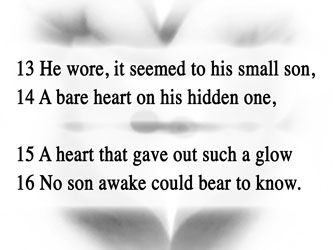
One must read lines 13 to 16 of the Secret Heart carefully. The idea of two hearts is brought into play at this point. We are given, “the bare heart” contrasted with “the hidden heart”. The hidden heart is actually the one that gives out a glow that “No son awake could bear to know”. So here is a good question, what does it mean to say, “No son awake could bear to know”?
Many have suggested that the poem is about revealing the real feelings of the father. Others have suggested that the poem demonstrates it’s okay for the father to show his feelings. This is an incorrect interpretation of the poem.
Again, we ask, what is it about the father’s hidden heart that would make it hard for the son to bear? There are no doubt many different answers here. We would like to suggest ours. The father is a rule giver. Consider that justice is, and must be, blind. There are rules, natural rules, the rules of God, the moral rules of the cosmos that simply must be obeyed. It’s the father’s role to enforce these rules.
Why does the father do this? He doesn’t have to do this, does he? He could shirk his responsibility, couldn’t he? At times a father must even punish his children when they don’t follow the rules, right? The father is the enforcer after all. Why does the father take up this role? Ultimately, he takes it up out of love. He does this for love.
Yet, if the father bore this love on his sleeve for his son to see all the time wouldn’t that make it difficult to bear his impartial enforcement of the rules? Do you see the tension here? This is why people are so moved when they read the poem. Often our fathers seem distant. They are the worldly figures in our life, doing not only the practical, rational thing, but the right thing. They aren’t supposed to be moved by tears or hugs, but by justice in a cosmic sense. Yet here it is revealed to the boy, that the father is actually acting out of love—and that’s why he does what he does. If he’s harsh at times or distant, it’s only because he must be. Ironically, loving the son at times means being strong and distant.
We are not suggesting you have to agree with this theme. Maybe you reject it, and that’s perfectly fine. However, we think that this is the fundamental tension that animates the poem.
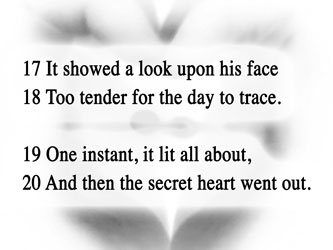
Lines 17 to 20, again deliver some beautiful imagery. The significant event here is that this view of the secret heart is but a glimpse. It’s there in this dreamlike world of half-sleep for only the length of time that a match burns. Then it’s gone. This is very important.
In general, we can’t ever really peer into another person’s mind or subjectivity. You can understand another person’s feelings by relating them to your own, but you can’t ever actually feel that other person’s feelings. In that sense, you must take their feelings on faith. In a way, this is a poem about faith. There’s no hard evidence here to son his father loves him. The boy is given but a vision of his father’s love. In the end, he must simply have faith that his father loves him. Again, we can see the religious implication here. One must have faith in God’s love, right? If there were hard evidence, then faith wouldn’t be necessary.
Again, we want to emphasize, you need not accept the narrator’s message or theme here—we are neither advocates or opponents. We are simply suggesting what we see as the poem’s essential theme.
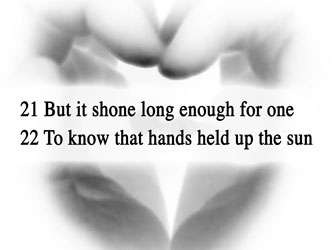
Lines 21 and 22 conjures up images of Atlas holding up all the world. The father is seen in a mythical light representing the paradox of both love and law. The father represents justice and strength, but only because he loves his children. We see these thematic symbols as a fitting conclusion to the poem.
The Secret Heart, poem meaning
We think it can be seen from our line by line analysis what we are suggesting as far as the meaning of the poem. The symbols from the Secret Heart all point toward a similar theme. The father is the force of law in our lives. He is the bedrock of our existence. This makes him strong, distant, and forceful. He is the ultimate enforcer. When we have a problem we tend to look to our mothers for sympathy not our fathers. Yet behind this important mask that the father must wear, we see that his real motivation is only love, the same love that gives us life.
The poem should not be given a modern touchy-feely interpretation suggesting it’s okay for a father to reveal his feelings. That’s plain out silly. Surely, it’s okay to disagree with the theme of the poem, but let’s not get it wrong.
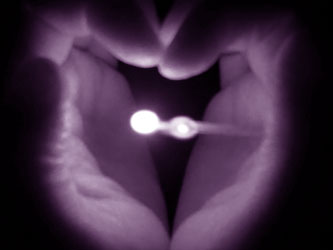
Robert P. Tristram Coffin Biography
Robert P. Tristram Coffin was born March 18, 1892 in Brunswick, Maine. He died on January 20, 1955 in Portland, Maine. He actually won the Pulitzer Prize for poetry in 1936—and in his time was quite a famous poet. In his early career as a poet, he was very interested in classic forms of poetry. His earlier poems are often called verbose and archaic. However, he eventually developed a simpler style that is clearly demonstrated in the poem the Secret Heart.
We hope you enjoyed this analysis of the Secret Heart poem. Make sure to subscribe to our updates. Stop by again soon!